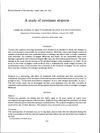Towards Dissecting the Pathogenesis of Retinoid-Induced Hair Loss: All-Trans Retinoic Acid Induces Premature Hair Follicle Regression by Upregulation of Transforming Growth Factor-β2 in the Dermal Papilla
June 2005
in “
Journal of Investigative Dermatology
”

TLDR All-trans retinoic acid causes hair loss by increasing TGF-β2 in hair follicle cells.
The document from 2005 reports a study that examined the effects of all-trans retinoic acid (ATRA) on human scalp hair follicles in culture to understand retinoid-induced hair loss. The study found that ATRA significantly reduced hair shaft elongation and induced premature entry into the catagen stage in about 80% of treated hair follicles by day 6, compared to 30% in the control group. This was linked to an increase in apoptotic cell numbers and a decrease in proliferation of hair matrix keratinocytes. A significant upregulation of transforming growth factor-β2 (TGF-β2) in the dermal papilla and dermal sheath was observed following ATRA treatment. Using a TGF-β neutralizing antibody partially reversed the ATRA-induced hair growth inhibition. The study concluded that ATRA induces hair follicle regression by upregulating TGF-β2 in the dermal papilla, and that TGF-β2/TGF-β receptor II antagonists might be potential treatments for retinoid-induced hair loss.






